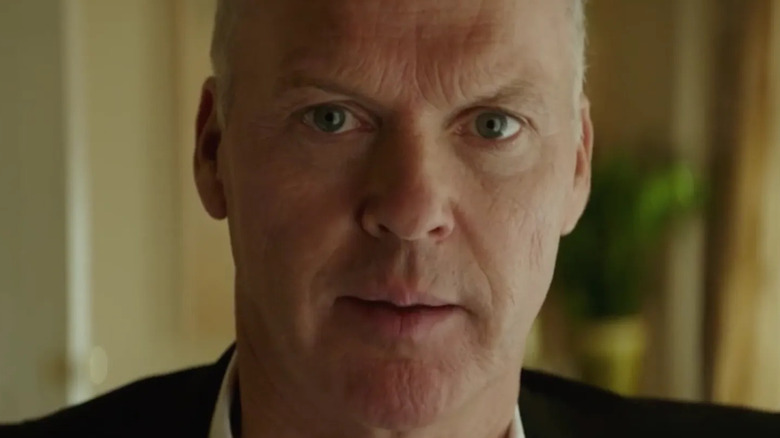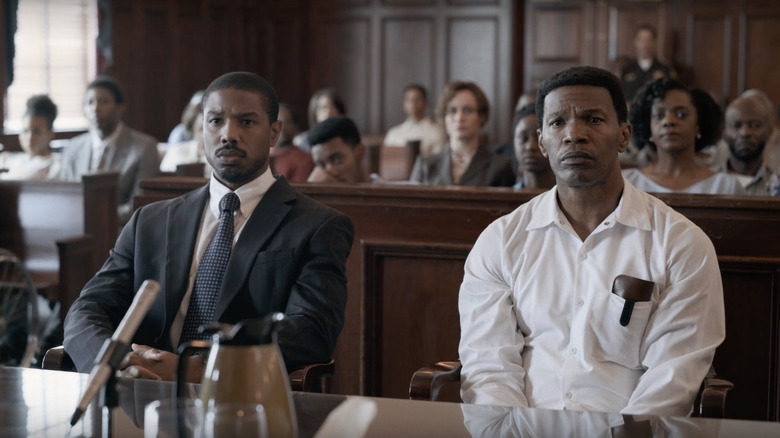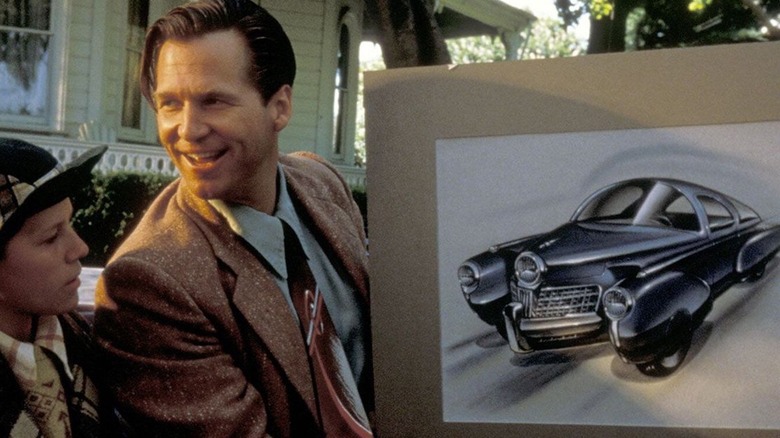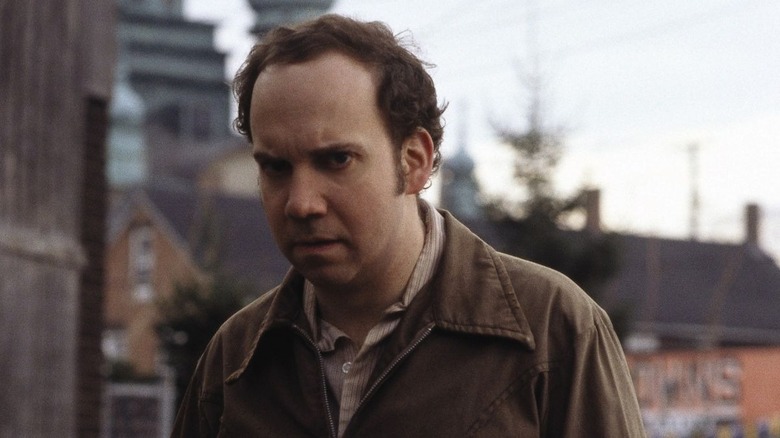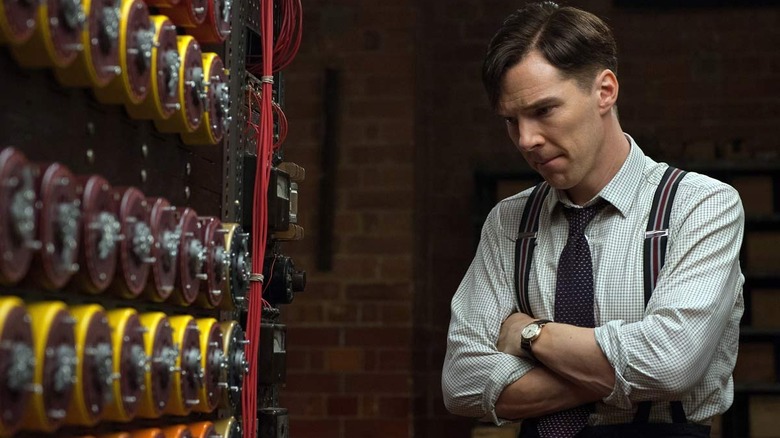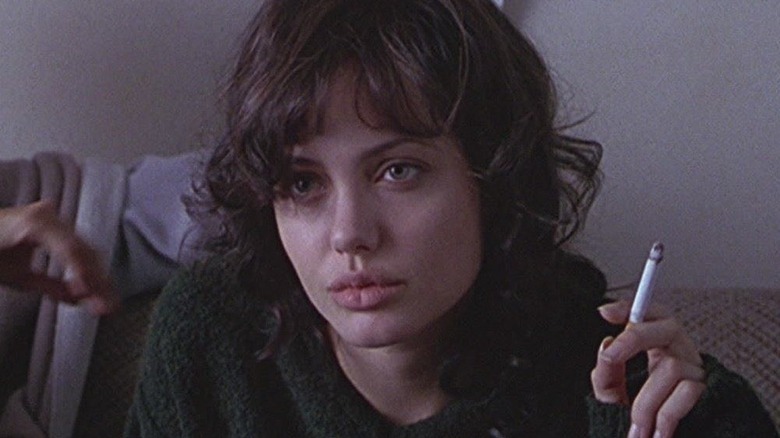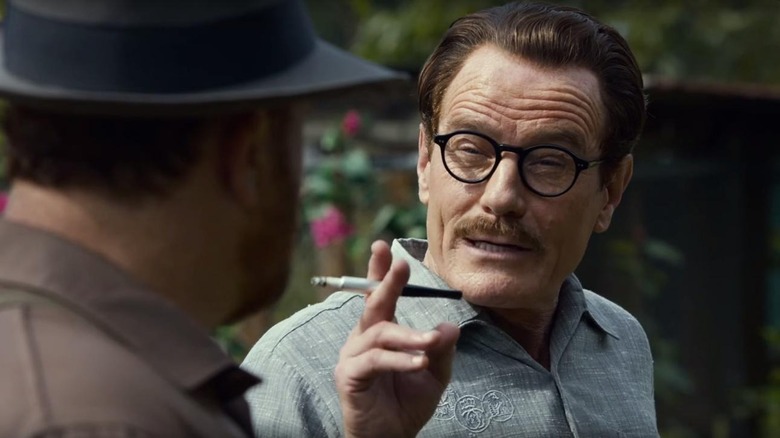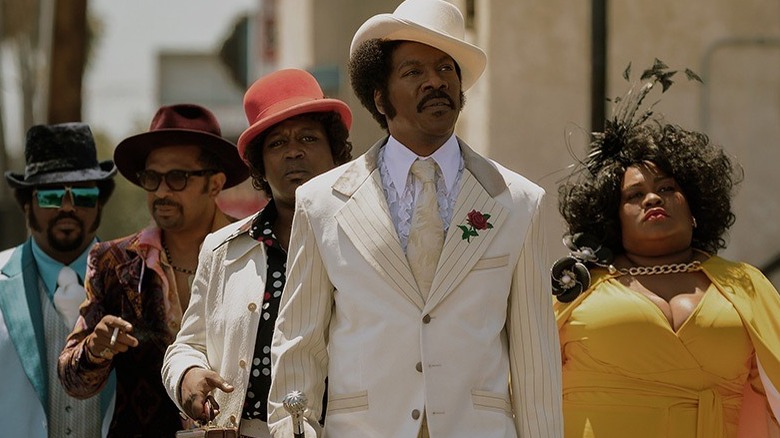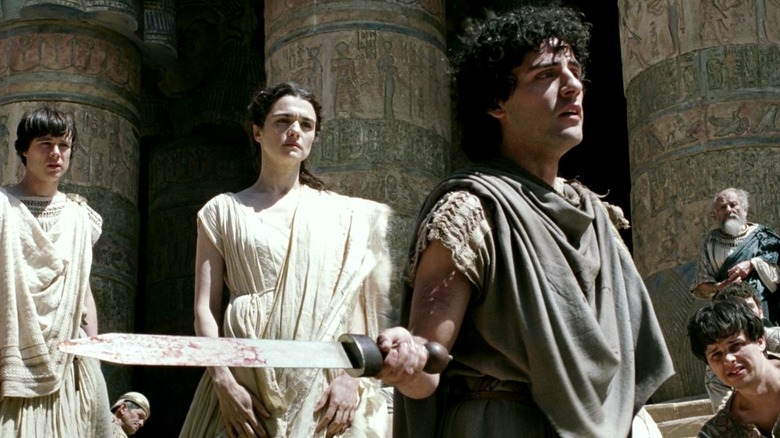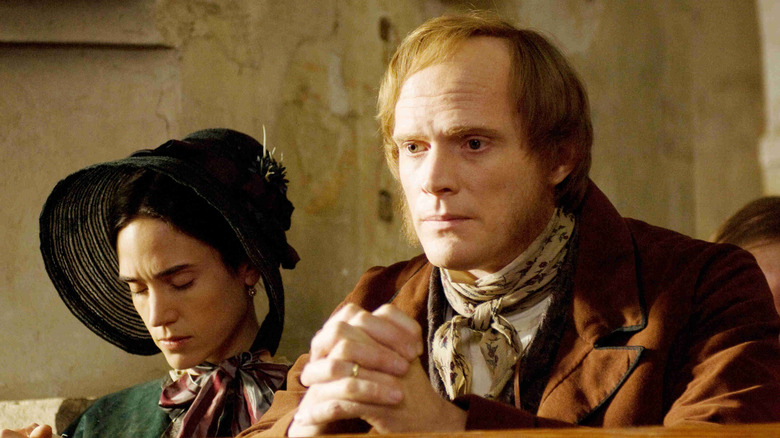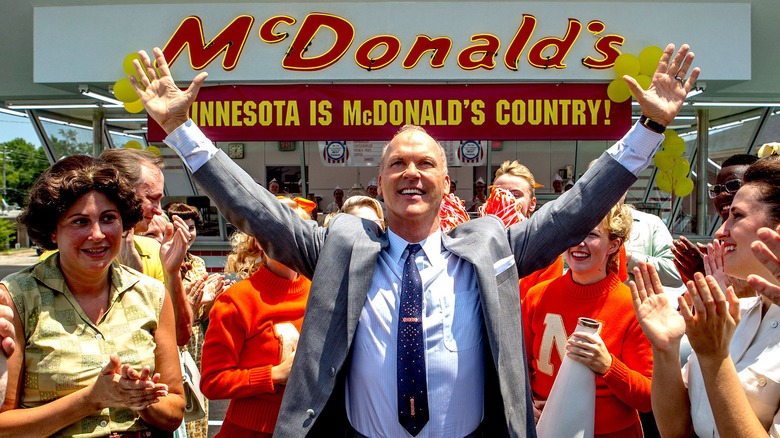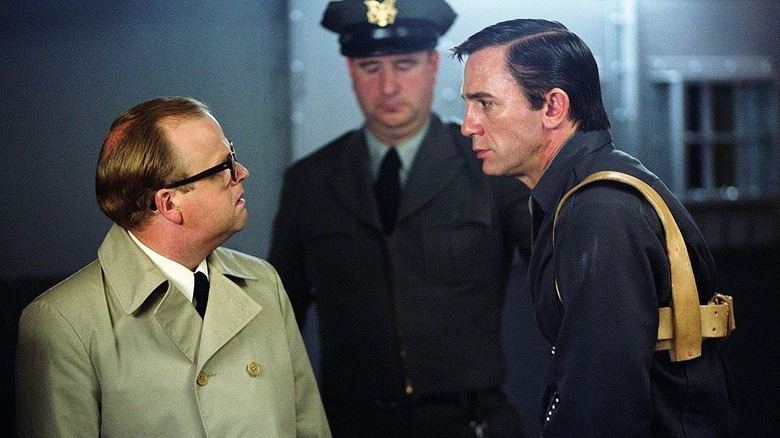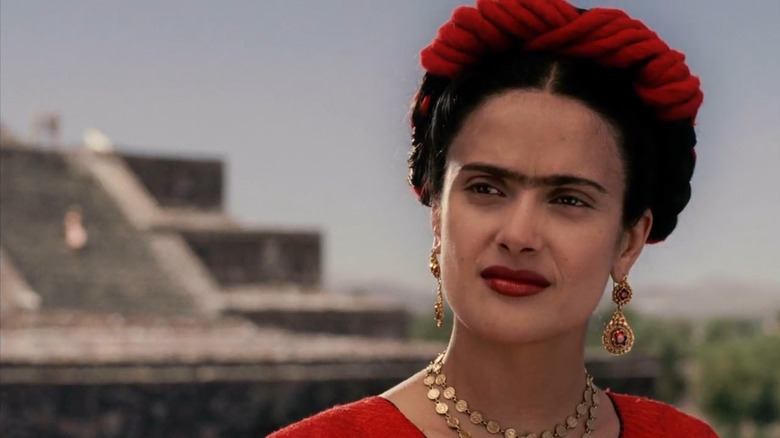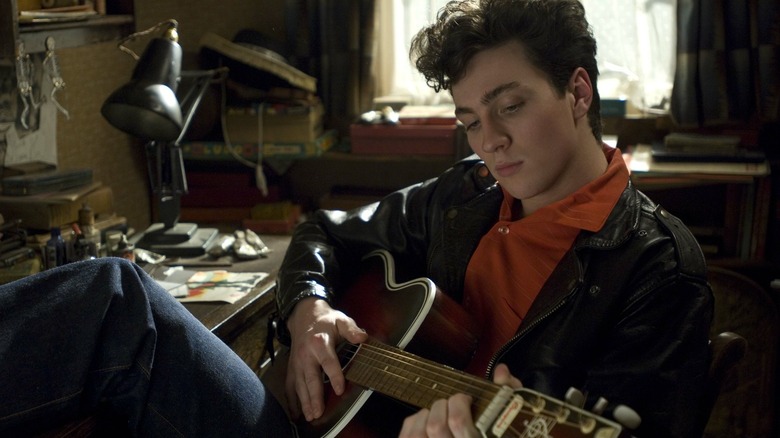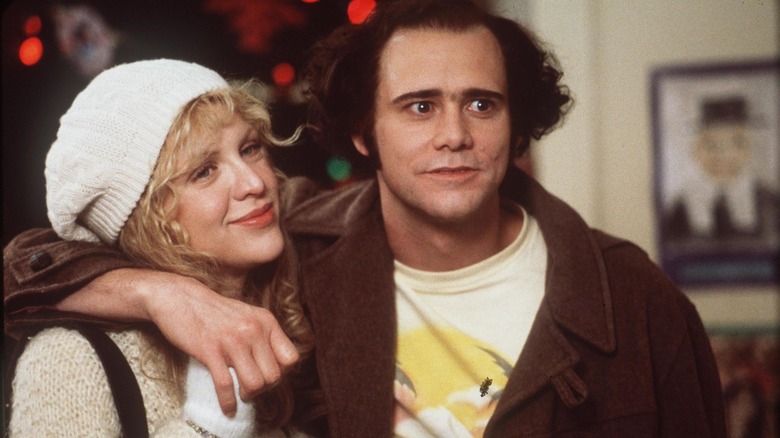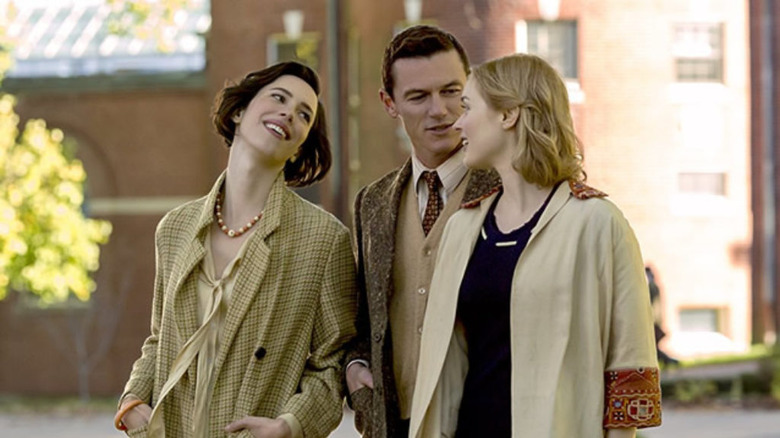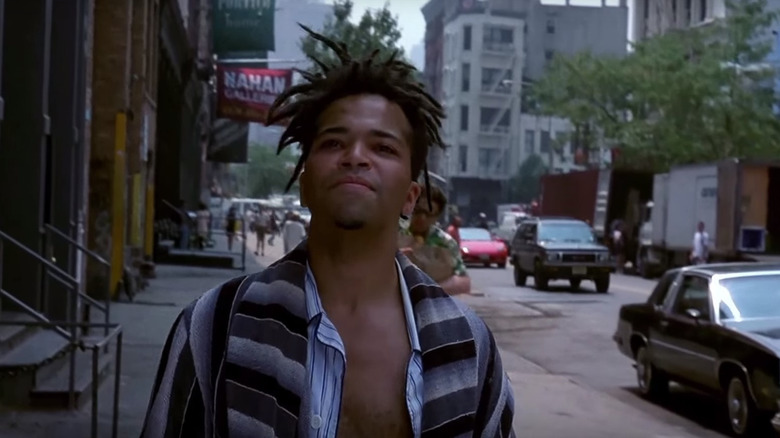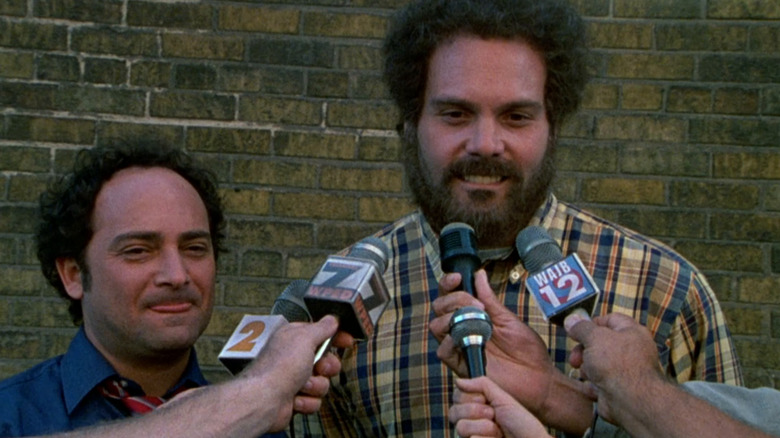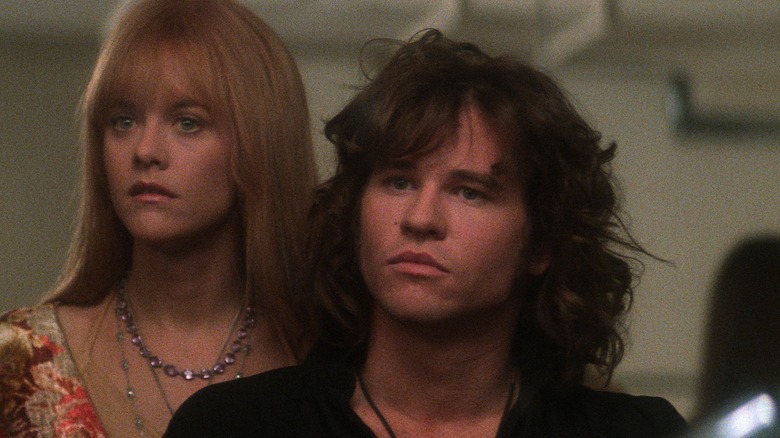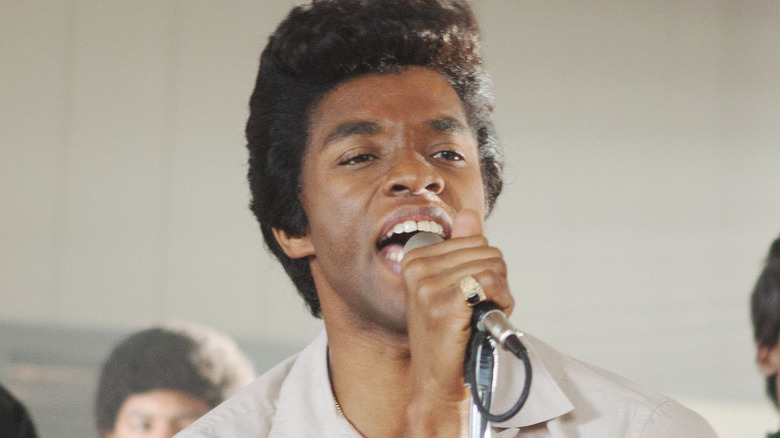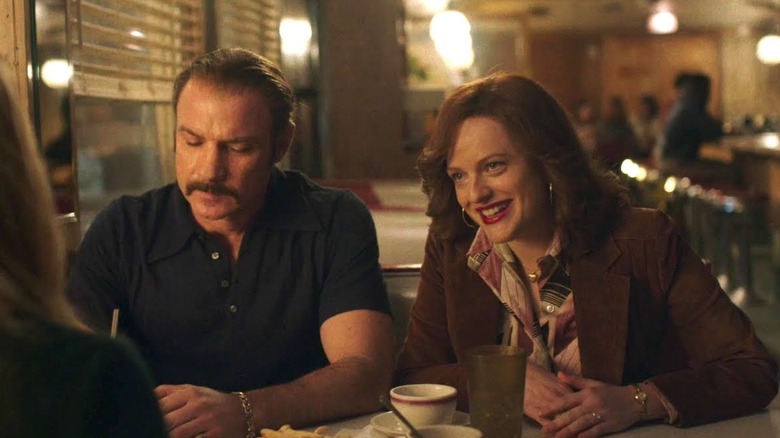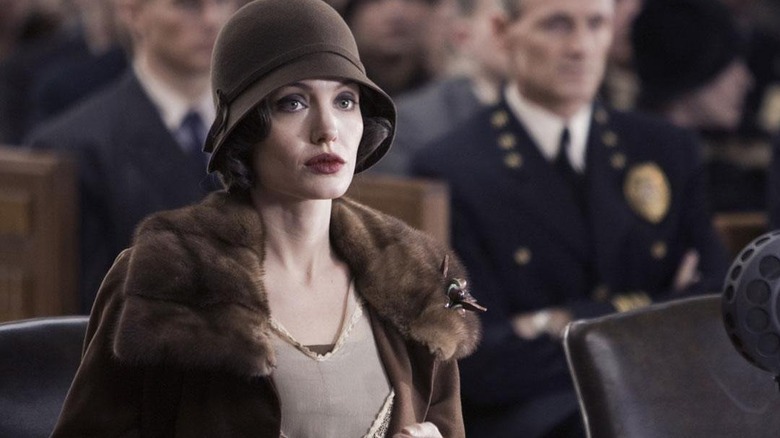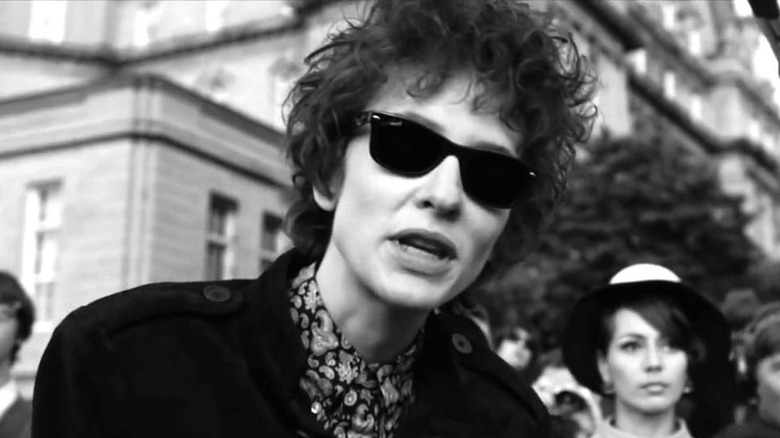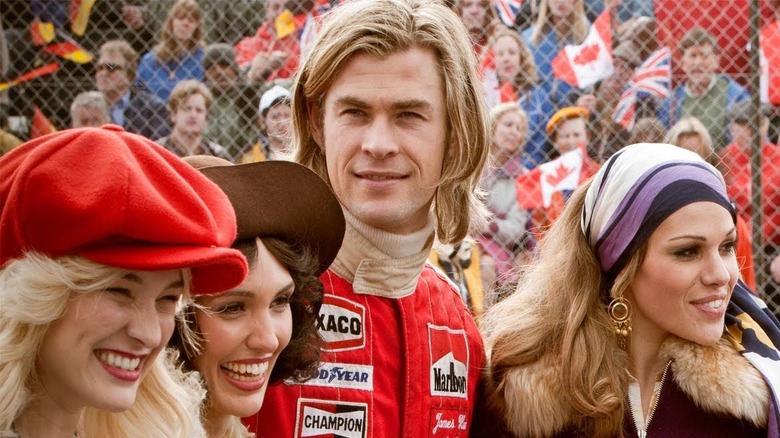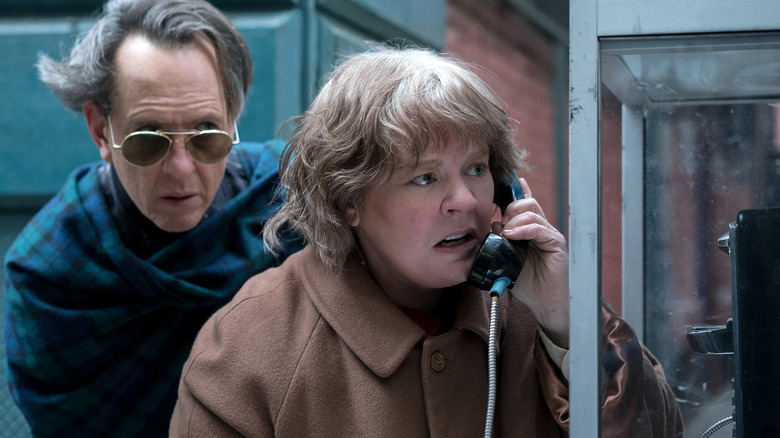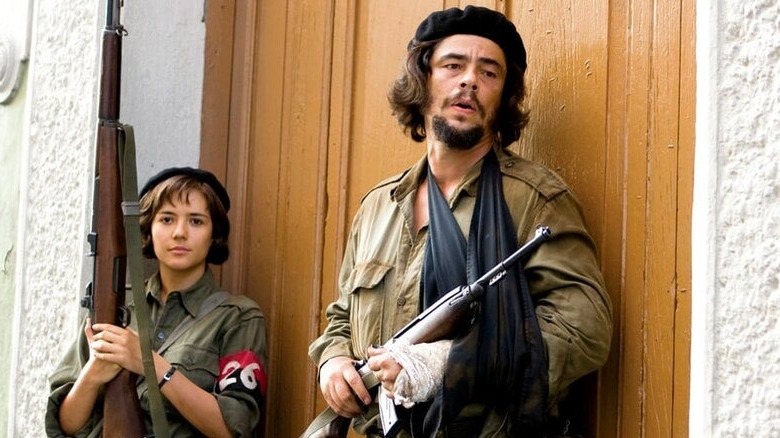25 Most Underrated Biopics Of All Time
The only thing more exciting than a dramatic story is when it's actually true and based on the exploits of a real-life figure. Whether it's a raucous comedy, a pulse-pounding drama, a thrilling true-crime caper, or a romance, movies are all the more compelling when we know that they've actually happened. That's why the biopic is a genre that continues to endure, telling remarkable true stories about famous historical figures, powerful politicians, troubled creative souls, and controversial business tycoons.
We've all seen the greats, movies like Steven Spielberg's "Schindler's List," Martin Scorsese's "Raging Bull," and even Tim Burton's "Ed Wood." From Oscar winners to box office hits, some of the biggest biopics remain among the best movies ever made. But there are plenty more, stories of unheralded figures and tortured souls that flew under the radar, that have been overshadowed by more popular movies, or were once talked about but have since faded away.
With the genre as popular as ever today, we thought it was long past time that we took a look back at the best from days gone by, to reveal the most underrated biopics that you should be watching.
Just Mercy
A pioneering advocate for equal rights in the justice system, lawyer and legal scholar Bryan Stevenson fought for clients from impoverished and minority communities, those who are frequently the most unfairly treated by the system. But his most passionate causes involved overturning wrongful convictions, and the 2019 biopic "Just Mercy" focused on his most highly publicized case. It's a powerful film whose status as an underappreciated movie is almost an allegory for overlooked victims of the system itself.
The film begins by showing Stevenson's early struggles as he forms the Equal Justice Initiative to help fight for social justice in the courts. But on a visit to death row to meet with potential clients, Stevenson (Michael B. Jordan) meets Walter McMillian (Jamie Foxx), awaiting execution for the apparent murder of a young woman. Despite the best evidence being the word of a convicted felon, he is found guilty, and the judge overrules the jury's recommendation of life in prison to impose the death sentence. With the odds stacked against him, Stevenson faces an uphill battle to save McMillian's life.
A minor theatrical release, "Just Mercy" boasts an impressive cast that includes Brie Larson, Tim Blake Nelson, and O'Shea Jackson Jr., with Destin Daniel Cretton ("Shang Chi and the Legend of the Ten Rings") in the director's chair. But beyond its star-studded pedigree, "Just Mercy" is a powerful film with a meaningful, overlooked story that may change how you view the American justice system.
Tucker: The Man and His Dream
When it comes to the history of the automobile, several famous names come to mind, but one important figure in the industry who often gets lost in the mix is entrepreneur and inventor Preston Tucker. While his dream car, "The Tucker '48," never quite took off as he had hoped, many of the innovative features that he developed for it have since become standard. In 1997, Francis Ford Coppola took the reins of his own passion project, a film based on Tucker's story.
Formerly a designer of armored vehicles and unique new gun turrets that saw service during World War II, Tucker (Jeff Bridges) takes to automobile production after the war, with dreams to make what he called "The Tucker Torpedo," a so-called car of the future. While off promoting his new designs though, Tucker's own company plots against him, fearing his ideas will result in financial ruin. Assisted by iconic inventor Howard Hughes (Dean Stockwell), Tucker is able to build a prototype himself, but just as it looks like his dream is about to come to fruition, he's caught up in a scandal, with allegations of stock fraud that threaten to derail his endeavor and destroy his reputation.
A lively tale, "Tucker: The Man and His Dream" also stars Joan Allen, Christian Slater, and Martin Landau. Though a flop in cinemas, it received good reviews, and deserved better than to be tossed in the trunk of forgotten biopics.
American Splendor
Renowned writers like Truman Capote, Sylvia Plath, and Charlotte Bronte have all received acclaimed biopics, but there have been few made about comic book writers, perhaps because for decades the medium was not well respected. But one artist and writer that finally did get his story told on screen was underground cartoonist Harvey Pekar, whose disillusionment with popular comic books of his youth led him to craft his own. His friendship with indie darling Robert Crumb got him published in the 1970s, but it was his autobiographical series "American Splendor" that put him on the map. In the 1980s, it was adapted into a stage production, and in 2003 it served as the basis for a biopic of the same name, starring Paul Giamatti.
A mix of drama and documentary, Pekar himself provides on-screen commentary throughout the film, including meta moments where he comments on the film itself. Moving from the '60s to the '70s and back again, we see a struggling Pekar (Giamatti) battling with depression and other ailments, and his burgeoning friendship with comics icon Crumb (James Urbaniak). Desperate to do something important with his life, the downtrodden Pekar is inspired and sets out to chronicle his life in comic book form, despite no formal training and a self-described lack of artistic talent.
Cleverly mixing live-action drama, animated inserts, and interviews with the artist himself, "American Splendor" is a unique biopic that garnered critical acclaim, but is rarely mentioned alongside other classics.
The Imitation Game
Equal parts spy thriller, underdog story, and social justice drama, the 2016 film "The Imitation Game" is all biopic, based on the life of renowned mathematician and computer scientist Alan Turing (played by Benedict Cumberbatch). Creator of the Turing Test — the theoretical guidepost to determine whether a computer was capable of thinking like the human brain — Turing was also deeply involved in cryptanalysis during World War II.
In addition to his groundbreaking research and game-changing achievements in computer science and mathematics though, Turing also struggled with his outcast status. But when the United Kingdom forms a new intelligence service, MI6, Turing is enlisted in a team of the country's brightest minds, who begin work unraveling coded enemy transmissions. There he recruits a young Cambridge graduate, Joan Clarke (Kiera Knightley), a brilliant young woman with whom he begins a unique relationship, while developing a new computer that he believes could crack the previously impenetrable German code.
Fighting an uphill battle against an establishment that doesn't believe in his ideas, Turing also fights against societal norms of the day as a closeted homosexual. In an era when his very existence could get him imprisoned, the risk of being discovered hangs over him throughout his life. An important film for a variety of reasons, "The Imitation Game" is both a taut war drama and a powerful social statement.
Gia
One of the original supermodels, Gia Carangi was at the height of her fame in the early 1980s. A stunning natural beauty, she graced the covers of popular magazines like Vogue and Cosmopolitan, but her rise to the top was anything but effortless and simple. Tragically lost at the age of 26 in 1986 to AIDS, Carangi was one of the first known names to die from the disease. Her life story became a film in 1998, an HBO original in the days before streaming, and was an early leading role for a young Angelina Jolie.
After a troubled youth in Philadelphia, the young and beautiful Carangi leaves for New York City to pursue a modeling career at just 17. Immediately snatched up by a prominent agency, she is catapulted to stardom faster than she ever expected, but trouble soon finds her again after the death of her mentor, Wilhelmina Cooper (Faye Dunaway). Turning to sex and drugs for relief, Gia begins a torrid and passionate love affair with fellow model Linda (Elizabeth Mitchell), who begs her to get clean. But unable to turn back from her downward spiral, Gia finds herself slipping down a hole she can't escape.
Perhaps because it was a television movie, "Gia" came and went quickly from the spotlight. But the film is a powerful story, helping to shine a spotlight on a lesser-known '80s icon, and hammers home the fact that the AIDS epidemic could affect anyone, even the rich and famous.
Trumbo
A Hollywood iconoclast, Dalton Trumbo was a major talent behind the typewriter, responsible for some of the most famous movies ever made, including "Spartacus," "Johnny Got His Gun," and "Papillon." A stalwart screenwriter, he became a controversial figure at the height of the Red Scare, when he was outed as an avowed communist, making him public enemy No.1 in Tinseltown. A film about Trumbo's life and struggles to defend himself and rehabilitate his image after the so-called Hollywood blacklist scandal, "Trumbo" landed in theaters in 2015, starring Bryan Cranston fresh off of his award-winning performance in "Breaking Bad."
Away from the confines of his grittier, darker persona Walter White, Cranston shined as the problematic and embattled Trumbo, who faces his darkest days when he's imprisoned for what were considered anti-American beliefs. Once back out in the free world though, the writer struggles to rebuild his career and his reputation, while being ordered to remain a loyal American citizen.
Illuminating a forgotten chapter in film's long and sometimes dark history, "Trumbo" was thought to be a shoo-in come awards season, but failed to pick up any trophies, though Cranston himself was nominated for Best Actor. While it may not be a classic, if you've ever wondered about Hollywood's golden age and the seedier side of the business that lurked behind the silver screen, don't miss this one.
Dolemite Is My Name
A surprise biopic that seemed to appear out of nowhere and disappear just as fast, the Netflix original "Dolemite Is My Name" stars comic legend Eddie Murphy in one of his best latter career roles. The film is based on the life story of a blaxploitation icon and raunchy stand-up comedian-turned-actor Rudy Ray Moore, who starred in a string of underground cult hits in the 1970s that included "Dolemite," "The Human Tornado," and "Petey Wheatstraw." But rather than a dramatic, understated period piece, "Dolemite Is My Name" opts to be a full-blown comedy, and excels.
The film begins with Moore having no success, unable to book gigs at even the smallest local comedy clubs. But when he develops a smooth-talking, jive-rhyming alter ego called Dolemite, he suddenly becomes the talk of the town. After a stint making the audience split their sides with laughter at his over-the-top and nearly x-rated routines, Moore becomes a bonafide sensation, and sets his sights on Hollywood, hoping to use his Dolemite persona to become a movie star. With an eclectic group of friends, the suddenly popular entertainer is determined to fund his own movie, no matter what wild obstacles he may find in his way.
A riotous laugher and surprisingly faithful retelling of Moore's unexpected rise from local DJ to movie star, "Dolemite Is My Name" received a pair of Golden Globe nominations, including one for Murphy.
Agora
Before either of them set foot in the MCU, stars Rachel Weisz ("Black Widow") and Oscar Isaac ("Moon Knight") teamed up for the 2009 historical drama "Agora." Centered on one of ancient Rome's most brilliant minds, the film stars Weisz as astronomer and philosopher Hypatia, who studied in the famed city of Alexandria, Egypt. The film focuses on the relationship between the intellectual teacher and her student Orestes (Isaac), who fight to bring forth new and dangerously different ideas that challenge accepted science and religious doctrine.
While the establishment accuses them of heresy for daring to theorize that the Earth may not be at the center of the celestial universe, and in fact may be a sphere, political struggles rock the Roman Empire. With Christianity on the upswing, new social ideas are changing the way people think about the world, and a battle of ideologies threatens to destroy Hypatia, Orestes, and the entire kingdom. What was once a fight for new knowledge suddenly becomes a struggle to save everything they've built as war rages on their doorsteps.
A long-overlooked figure in Roman history, Hypatia finally gets the spotlight in "Agora," which deserves to be mentioned along with other giants of the genre. With its all-star cast and bold, sweeping visuals, it's a treat for movie and history buffs alike.
Creation
Scientific researcher, naturalist, and biologist Charles Darwin's work is so profoundly important to the way we look at the natural world today that he's never stopped being a controversial figure in some circles. But before he was labeled a heretic by the religious community at large for his theories of evolution and natural selection, Darwin clashed with a religious figure who sat much closer to home. The 2009 film "Creation" chronicles Darwin's life work, focusing on the troubled relationship he had with his devout but loving wife, Emma.
Played by real-life Hollywood couple Paul Bettany and Jennifer Connelly, this dramatization covers the hardest part of both Darwin's professional career and his troubled personal life. While he works feverishly to find the evidence to support his revolutionary ideas on evolution, he comes into conflict with the religious Emma. But it's not just his work that comes between them, as the sudden death of their young daughter proves deeply traumatic and haunts them both, leading to more trouble in the wake of Darwin's turn away from his faith.
A well-told story about one of science's most notable names, "Creation" was barely noticed by audiences, despite a strong lead performance that drew praise from reviewers.
The Founder
Released in 2017, it's possible you've never even heard of "The Founder," the story of the man who created McDonald's. Well, not the one who actually started the landmark burger chain, but the man who stole it from the two brothers who did, a crafty future tycoon named Ray Kroc (played by Michael Keaton). It's a story that's almost too unbelievable to be fiction, how Kroc took a little burger stand and turned it into the world's biggest fast-food restaurant chain, revolutionizing the service industry in the process.
With a brilliant script and even better performances, the magic of "The Founder" is in the details, from its strong direction and charismatic cast, including Nick Offerman and John Carroll Lynch as the unwitting McDonald brothers, to its focus on the fun side of building a burger empire. But its greatness is hard to pin down, much like the magic behind McDonald's itself. As Kroc points out to the two founding brothers — who themselves didn't even know the secret to their own success — perhaps it's all in the name.
Infamous
Arguably one of the greatest authors of the 20th century, Truman Capote was a complicated figure, with a life story ripe for adaptation into a feature film. Yet there were none until 2017, when incredibly two dropped within a year of each other: the Oscar-winning "Capote" in 2005 starring Phillip Seymour Hoffman, and our next pick, "Infamous" a year later starring Toby Jones. While Hoffman's rendition of the acclaimed writer got all the attention, Jones' has been criminally overlooked.
Like "Capote," 2006's "Infamous" follows Capote during his research for his best-selling true-crime novel "In Cold Blood." After reading about a grisly murder case in The New Yorker where an investigation is still ongoing, Capote travels to the scene of the crime in Kansas alongside friend and fellow author Nelle Harper Lee (Sandra Bullock). Despite misgivings from law enforcement, Capote is given access to witnesses, suspects, and more, planning on using the murder as the basis for his next novel. But when the author develops a strange fascination with one of the suspects, Perry Smith (Daniel Craig), Capote finds himself in serious danger.
Overshadowed by Hoffman's earlier version, "Infamous" was sorely underappreciated. But the New York Times review of the film by A.O. Scott noted that it might just be an even better retelling of Capote's tale, describing it as "quick-witted, stylish and well acted" while calling it out as a moving interpretation of a captivating figure in fiction.
Frida
Sometimes an actor bears such an uncanny resemblance to the real-life figure that it feels like they were born for the role. Such was the case in 2002 when Salma Hayek starred as artist Frida Kahlo in the eponymously titled "Frida." Resembling one of the artist's self-portraits come to life, Hayek portrayed Kahlo's difficult journey with subtle grace and iconic strength.
From Kahlo's life-altering injury in a bus accident to her turbulent 10-year marriage to famed muralist Diego Rivera (Alfred Molina) when she was just 22 years old, the film recounts decades of the artist's life. Director Julie Taymor is interested in more than just Kahlo's art though, and is unafraid to show her many struggles. We see Kahlo's troubles with alcohol and controversial associations with a number of powerful figures, such as wealthy real estate magnate Nelson Rockefeller (Edward Norton), and her rumored affairs with Marxist revolutionary Leon Trotsky (Geoffrey Rush), singer Josephine Baker (Karine Plantadit), and photographer Tina Modotti (Ashley Judd).
Taymor uses Kahlo's art to form a unique visual narrative as scenes flow out of the paintings themselves. Hailed by critics at the time, Roger Ebert gave "Frida" 3.5 stars, who appreciated how the film's tone mirrored Kahlo's style. "Sometimes we feel as if the film careens from one colorful event to another without respite, but sometimes it must have seemed to Frida Kahlo as if her life did, too."
Nowhere Boy
Music stars often lead rocky lives, caught up in the glamor of sex, drugs, and fame, and are sometimes tragically lost before their time, making them perfect subject matter for an engrossing drama. As a result, notable stars like Johnny Cash, Elton John, and rock group Queen have all been the subject of some of cinema's most memorable biopics. There have also been a few underrated real-life stories centered on musicians, such as "Nowhere Boy," a 2009 biography of Beatles legend John Lennon.
Before rising to stardom in blockbuster movies like "Godzilla," and "Avengers: Age of Ultron," young actor Aaron Taylor-Johnson starred as the teenage Lennon. Portraying the musician's formative years, the film shows the future Beatle living with his extended family where he struggles with the death of his uncle. Eventually, to deal with his problems, Lennon turns to music and forms a band called the Quarrymen alongside a fellow guitar player named Paul McCartney (Thomas Sangster).
Though the early days of the Beatles are explored in the film, the real focus is on how his music helped him cope with the many problems in his youth, in particular his tumultuous relationship with his mother (Anne-Marie Duff) and Aunt Mimi (Kristin Scott Thomas). Though well-received, "Nowhere Boy" went almost entirely unseen when released, but was given high marks for its understated nature.
Man on the Moon
When it comes to stars who died too young, stand-up comedian Andy Kaufman certainly comes to mind. But rather than being taken too soon by drugs, alcohol, or dangerous behavior, the "Saturday Night Live" performer was lost to cancer at the age of 35. In 1999, comedian Jim Carrey, the slapstick star of "The Mask" and "Ace Ventura: Pet Detective," changed gear, taking on the role of Kaufman in the biopic "Man on the Moon." It was the perfect next step for the actor after "The Truman Show," as a more sensitive biography of the complicated comedian allowed him to retain his wry sense of humor while also flexing his dramatic acting chops.
From his early start as a young stand-up comedian, we see how Kaufman's offbeat and sometimes surrealist humor initially put off audiences. But when his acting talent is noticed by agent George Shapiro (Danny DeVito), Kaufman gets a gig on prime-time television, in the sitcom "Taxi," which makes him famous, even if he absolutely hates it. With appearances on "SNL" and late-night talk shows, he becomes a hit with audiences, but is brought crashing down to reality when faced with a cancer diagnosis. However, thanks to his years spent pranking his friends and family, those closest to him are hesitant to believe him.
A heartfelt, tear-jerking drama highlighted by one of Carrey's strongest performances to date, "Man in the Moon" is a biopic that stands up with the best and most unique in the genre.
Professor Marston and the Wonder Women
The biggest characters in comic books often make their creators household names, like Stan Lee or Bob Kane. But often overlooked is William Moulton Marston, the man who created Wonder Woman, who also happened to be the inventor of the polygraph. But while those who know of him have rightly connected the character's "Lasso of Truth" to his groundbreaking innovation, few know the story behind the women in his life who inspired the character's creation. The underrated 2017 biopic, "Professor Marston and the Wonder Women," tells that startling and sometimes controversial story.
Starring Luke Evans in the title role, we meet the renowned psychologist Dr. Marston and his wife Elizabeth (Rebecca Hall) as they work on creating what will eventually become the modern polygraph machine. Their research assistant is a young student named Olive Byrne (Bella Heathcote), and their work together soon progresses into something more. Eventually, they form a unique three-person romantic triad, while Marston's interest in fetish art spurs him to create a comic book heroine fashioned after the two women in his life.
A biopic about an unwritten page in comic book history, "Professor Marston and the Wonder Women" opens up the hero's back issues to reveal a fascinating and unconventional romance.
Basquiat
https://www.britannica.com/bio...If you're looking for a true diamond in the rough, this is the biopic you want to queue up next. The 1996 film "Basquiat" tells the story of Jean-Michel Basquiat, a celebrated artist who rose to prominence in the 1980s during the neo-expressionist movement, and died at the height of his fame when he was just 27 years old. The film stars a young Jeffrey Wright ("Westworld") as Basquiat himself, and acclaimed music legend David Bowie as controversial artist Andy Warhol. Benicio Del Toro, Gary Oldman, Dennis Hopper, and Claire Forlani fill out the star-studded cast, with Sam Rockwell, Willem Dafoe, Christopher Walken, Courtney Love, and Parker Posey in supporting roles.
Inspired by the real-life rags-to-riches story, the film begins with Basquiat as a homeless artist living on the streets of New York City, selling his work to anyone who will buy it. But a chance meeting with Andy Warhol helps bring him to the attention of the art world, and soon he becomes a darling of the celebrity scene in the Big Apple. But difficulties in his relationships, followed by the untimely death of his newfound mentor Warhol, lead Basquiat down a tragic trail that he cannot turn back from.
Led by Wright's powerful and sensitive performance as the soft-spoken young artist, "Basquiat" was hailed at the time, but never a big hit in theaters. Less talked about today, now is the perfect time to discover it, with Wright now a major Hollywood star.
Steal This Movie!
Based on the wild life of Abbie and Anita Hoffman, a pair of counterculture revolutionaries in the '60s and '70s, "Steal This Movie!" took its title from Hoffman's guidebook to radical activism, "Steal This Book!" Starring Vincent D'Onofrio and Janeane Garofalo as the central couple, the film has been criticized by fellow activists and those who knew the couple, as well as those who disliked their politics. While it's not perfect it remains a breezy, fun biopic that's been sorely neglected over the years.
While there have been a few films about Hoffman's involvement in the infamous Chicago Seven trial that saw him indicted on conspiracy charges — including the 2020 film "The Trial of the Chicago 7" — "Steal This Movie" takes a broader look at Hoffman's life. The case is covered in the film, but it's just one part of an incredibly eventful story that covers the entirety of Hoffman's activist career. The film chronicles everything from his early enlightenment to portraying how he used theatrics and the media to get attention for his causes.
Famously, Hoffman's son America filed suit over the movie in 2000, upset about his portrayal in the film, where he was played by a young Michael Cera. The younger Hoffman alleged invasion of privacy, and that his consent had not been given for his "character" to appear in the film. He settled out of court a year later.
The Doors
Watching Oliver Stone's biopic "The Doors" — centered on the legendary rocker and frontman Jim Morrison — it's hard to see where star Val Kilmer ends and his character begins. An eerie performance from the future "Batman Forever" star brings the haunted and introverted singer to life in a once-in-a-lifetime role that is among his very best. While criticized by some for its historical inaccuracies, the film isn't intended to be a true-to-life picture chronicling the history of Morrison's band, but in capturing the soul of Morrison the man. And in doing just that, "The Doors" rises to superstardom.
Portrayed as a vocal visionary, the film explores how Morrison's controversial performances and defiance of the status quo helped The Doors become rock icons. But it also delves deep into his troubled psyche, and his struggles with depression and isolation. The film never shies away from Morrison's excessive lifestyle and problems with drugs, and shows how this, exacerbated by his meteoric rise to stardom, turned him into an unpredictable loose cannon, ultimately leading to his shocking, premature death.
Despite the critics who knocked it for altering some important facts, it gets the crucial beats right. And in the end, the power of "The Doors" doesn't lie in the historical details, but in the depiction of the man behind the myth, one of rock 'n' roll's most complicated and talented figures who became a true American icon.
Get On Up
Taken well before his time, Chadwick Boseman became a global superstar thanks to playing the title role in Marvel's "The Black Panther." But outside of the MCU he was potentially best known for starring in biopics of American icons, from groundbreaking baseballer Jackie Robinson to Supreme Court Justice Thurgood Marshall, and even appearing as a supporting character in "Ma Rainey's Black Bottom." However, his most underrated performance is surely the 2014 biographical drama centering on the life and career of soul singer James Brown, "Get On Up." Co-starring Viola Davis, Octavia Spencer, and Dan Aykroyd, it was the last film Boseman made before he landed the part of T'Challa in "Captain America: Civil War," which marked a major turning point in his career.
Jumping around in Brown's extraordinary life, we see different episodes from Brown's childhood, his success on stage, and his later years. We see his rise to fame, his legendary ego, and his dark and abusive periods which are never sanitized. Landing to mixed reviews, no one is going to say "Get On Up" ranks as highly in Boseman's filmography as "42" or even "Marshall." But it's been sorely overlooked because a few critics didn't like its oversimplified story and cliched beats. But if you don't know much about Brown, this is an easy and enjoyable primer, and Boseman gives a charismatic and soulful performance that makes the movie worth watching.
Chuck
Well known to fans of boxing, those on the outside may not recognize Chuck Wepner by name, but you might know him by reputation. The 2011 drama "Chuck" stars Liev Schreiber as the real-life fighter Wepner, who was on the losing end of Muhammad Ali's heavyweight title fight in 1975, and served as the inspiration for the 1976 classic "Rocky."
Like Rocky Balboa, Wepner had a nickname, the Bayonne Bleeder, named for his hometown of Bayonne, New Jersey which sits right across from New York City. Known for his dangerous bouts and iron jaw, he's hopeful of a fight against current heavyweight title-holder George Foreman. But when the world is stunned by Foreman's loss to Ali in Manila, Wepner is chosen as the man to go up against the People's Champ in the 1975 title defense bout. Defying all odds, Wepner lasts until the 15th round, and despite a loss becomes a hero to his community. But after flying so high, Wepner struggles in the aftermath, leading to a downward spiral.
With a supporting cast that includes Elisabeth Moss, Ron Perlman, Naomi Watts, Jim Gaffigan, and Michael Rapaport, "Chuck" is a remarkable true story that in some ways acts as a "what if" alternate sequel to "Rocky." Completely overlooked in 2017, it was a flop in theaters, but not because it wasn't a good film. Perhaps with the right promotion, it could have been a contender.
Changeling
If you're an avid listener of true-crime podcasts, you've likely heard of the story of the Wineville Chicken Coop Murders, the incredible true story that formed the basis for the 2008 period drama "Changeling," directed by Clint Eastwood. But more than just a real-life crime drama, "Changeling" tells the story of one of the people who was most affected by the killers despite not being one of their victims: Christine Collins (Angelina Jolie).
Collins' unbelievable story begins when in 1928 she discovers her 9-year-old son Walter has gone missing. Rallying support from her community, Collins puts pressure on the embattled Los Angeles Police Department to find her son and those responsible for his suspected abduction. Facing mounting scrutiny over a case gaining national attention, the LAPD does the unthinkable, producing a child they claim is Walter, and providing a highly publicized reunion of mother and son. The only problem is that the child is not her son at all, no matter how many times they insist they've found the right boy. But when Collins protests, she's labeled a liar and forcibly institutionalized.
Perhaps one of the most unbelievable true stories on this list, "Changeling" is sure to leave your mouth agape in anger and disbelief, but despite some minor changes to the story, it's all true. But what makes the film even more powerful is how it examines corruption, violence, and the way strong women are viewed in their fight for agency.
I'm Not There
One of the most unusual biopics ever, Todd Haynes' "I'm Not There" tells the story of the iconic folk singer Bob Dylan, with multiple actors portraying the musician, each one embodying a different aspect of his persona at various points in his life. Among the actors cast in the role of Dylan are Christian Bale, Richard Gere, Heath Ledger (in one of his final roles), and Cate Blanchett.
Moving back and forth between seven different stories, the film could have easily been a haphazard melange of clashing ideas, but the result is a fascinating look at Dylan's life and music. Like "The Doors," the movie is less about the details of Dylan's life, (in some cases intentionally exaggerating true events) and instead focuses on the heart of the man behind the guitar. In the seven fictionalized stories, the characters aren't even named Bob Dylan, and the events shown are largely fictional. But together, they come to express a look at who Dylan was, what his music really meant, and how each phase of his life contributed to the whole of who he was.
Challenging our ideas of what a biopic could be, "I'm Not There" may not even qualify as one to some of the more particular critics out there. But for our money, it's one of the most unique and underrated big-screen adaptations of the life of a legendary musician that's ever been produced.
Rush
Despite a big-name director in Ron Howard ("Apollo 13") and a big star in the lead role in Chris Hemsworth ("Thor: Ragnarok"), the big-screen biopic "Rush" never became the hit it deserved to be. The film recounts the bitter rivalry between two Formula One drivers: James Hunt (Hemsworth) and Niki Lauda (Daniel Brühl). It's a well known story among fans of British motor racing, but not so much to wider film audiences, making it ideal for adaptation.
The movie introduces us to brash English driver Hunt, a man with style and swagger and the hair to match, and his chief adversary Niki Lauda, an Austrian with a serious chip on his shoulder. In 1970, Hunt beats Lauda in a tight race, leading the Austrian on a quest to take Hunt down a peg, all culminating in the thrilling 1976 championship race. A tale of two men in a death-defying sport going head-to-head for all the marbles is drama enough, but Howard's ability to capture the exhilarating action on the racetrack makes it not just an underrated biopic, but one of the best racing movies ever made.
Praised for its accuracy by Lauda himself, "Rush" was a modest success at the box office and a hit with reviewers, but it never was as appreciated by audiences as it should have been.
Can You Ever Forgive Me?
Some of the best biopics about heinous criminals feature some of the most grisly murderers society has ever seen, but sometimes the most extraordinary true-crime stories are the ones where nobody is killed. One such example is "Can You Ever Forgive Me?" based on the story of Lee Israel, a woman who masterminded an escalating criminal conspiracy that while serious, wasn't enough to warrant jail time. Based on her comedic memoir, the film tells the story of how her innocuous attempts to eke out a living snowballed into an elaborate criminal scheme.
It all begins with the beleaguered writer Lee Israel (Melissa McCarthy) unable to secure a new book deal and struggling to pay her bills. When she sells a letter from Katharine Hepburn from her private collection and earns a tidy sum, she realizes she can make a side hustle forging letters from dead celebrities. She quickly realizes that this is a way to earn some real money, and with the help of her old friend Jack (Richard E. Grant), she gets bolder, stealing actual letters from various library collections and replacing them with her own fakes.
A brilliant comedic thriller, "Can You Ever Forgive Me?" proved the perfect vehicle to showcase comedian McCarthy's broader dramatic talents. Like many on this list, it was released with little publicity, and few even knew of its existence, but if you're looking for something clever and fresh, this underrated gem is it.
Che
There are few historical figures more polarizing than political revolutionaries, and typically the most renowned is also the most divisive: Marxist freedom fighter Ernesto "Che" Guevara. The subject of several big-screen biopics, perhaps the most underappreciated of these is the 2008 epic, "Che," by director Steven Soderbergh ("Ocean's Eleven"). The film starred Benicio Del Toro in the title role, with Santiago Cabrera ("Star Trek: Picard") and Rodrigo Santoro ("Westworld") in supporting roles. With a major star and an acclaimed director, you would be forgiven for wondering how this slipped under the radar, but the answer may just be its mammoth four-and-a-half-hour runtime.
With enough time to explore plenty of Guevara's travels and many fights, "Che" cuts back and forth between different periods in his life. Split into two distinct parts, the film shows us every important moment in his career as a guerilla, resistance leader, military tactician, and diplomat. Soderbergh comprehensively takes us through such crucial moments as Guevara's struggle to bring revolution to Bolivia, his address to the United Nations in 1965, his first meeting with Fidel Castro (Demián Bichir), and the eventual toppling of Batista.
Based in part on Guevara's writings, there is an authenticity and earnestness to the film that helps it stand out from other similar biopics of militant leaders. With a focus on Che Guevara the man, "Che" is a prestige picture that possesses a heart and soul that many biopics often lack.
